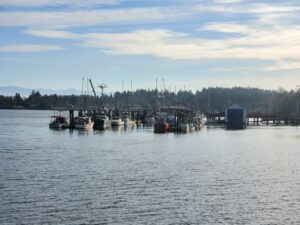Dr. Jennifer Silver (she/her), a professor and associate chair in the Department of Geography, Environment, and Geomatics at the University of Guelph, is an established researcher known for integrating critical Indigenous perspectives into her interdisciplinary research on fish and fisheries. But as a non-Indigenous person, she didn’t initially set out to learn how history, culture, and power affect natural resource management.

As a PhD student working in coastal British Columbia, she had the opportunity to live and work in a remote First Nations community. She participated in the social life of the community and got to know people, their histories, and experiences. It took time and careful listening, but what she came to understand is that delving into history and interrogating Western science and institutions enabled her to ask and answer better research questions, such as:
“Why is Western fisheries science the way it is?
“How do colonial assumptions and biases underpin the science, and the way institutions manage people and fish?”
Recently, Dr. Silver and collaborators published a piece that offers some insight. The article looks critically at how Western fisheries science has been built into settler-colonial institutions that monitor and manage fish, excluding Indigenous knowledge and marginalizing or even criminalizing Indigenous people and fishing practices. She and her collaborators, a team of Indigenous and non-Indigenous colleagues, argue for reforms that allow for plural knowledge and inclusive governance to rebalance power relations in and around fisheries management.
Dr. Silver offers pointers for non-Indigenous natural resource management scholars wanting to begin understanding and integrating Indigenous perspectives.
Lately, Dr. Silver is continuing to work with Indigenous leaders and scholars and others through the Clam Garden Network to support First Nations trying to reconstruct inter-tidal clam garden walls to support local clam harvest.